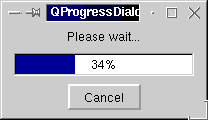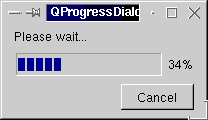
Provides feedback on the progress of a slow operation. More...
#include <qprogressdialog.h>
Inherits QSemiModal.
A progress dialog is used to give the user an indication of how long an operation is going to take to perform, and to reassure them that the application has not frozen.
A potential problem with progress dialogs is that it is difficult to know when to use them, as operations take different amounts of time on different computer hardware. QProgressDialog offers a solution to this problem: it estimates the time the operation will take (based on time for steps), and only shows itself if that estimate is beyond 3 seconds.
Example:
QProgressDialog progress( "Copying files...", "Abort Copy", numFiles, this );
for (int i=0; i<numFiles; i++) {
progress.setProgress( i );
if ( progress.wasCancelled() )
break;
... // copy one file
}
progress.setProgress( numFiles );


See also: QDialog, QProgressBar and GUI Design Handbook: Progress Indicator
Examples: progress/progress.cpp
Constructs a progress dialog.
Default settings:
parent, name, modal, and f are sent to the QSemiModal::QSemiModal() constructor. Note that if modal is FALSE (the default), you will need to have an event loop proceeding for any redrawing of the dialog to occur. If it is TRUE, the dialog ensures events are processed when needed.
See also: setLabelText(), setLabel(), setCancelButtonText(), setCancelButton() and setTotalSteps().
Constructs a progress dialog.
Arguments:
See also: setLabelText(), setLabel(), setCancelButtonText(), setCancelButton() and setTotalSteps().
Destroys the progress dialog.
[slot]Reset the progress dialog. wasCancelled() becomes TRUE until the progress dialog is reset. The progress dialog becomes hidden.
[signal]This signal is emitted when the cancel button is clicked. It is connected to the cancel() slot by default.
See also: wasCancelled().
[slot]Returns the currently set minimum duration for the QProgressDialog
See also: setMinimumDuration().
Returns the current amount of progress, or -1 if the progress counting has not started.
See also: setProgress().
[slot]Reset the progress dialog. The progress dialog becomes hidden.
[virtual protected]Handles resize events for the progress dialog, sizing the label, dialog, and cancellation button.
Reimplemented from QWidget.
Sets the progress bar widget. The progress dialog resizes to fit. The progress bar becomes owned by the progress dialog and will be deleted when necessary.
Sets the cancellation button. The button becomes owned by the progress dialog and will be deleted when necessary, so do not pass the address of an object on the stack.
See also: setCancelButtonText().
[slot]Sets the cancellation button text.
See also: setCancelButton().
Sets the label. The progress dialog resizes to fit. The label becomes owned by the progress dialog and will be deleted when necessary, so do not pass the address of an object on the stack.
See also: setLabelText().
Examples: progress/progress.cpp
[slot]Sets the label text. The progress dialog resizes to fit.
See also: setLabel().
[slot]The dialog will not appear if the anticipated duration of the progressing task is less than ms milliseconds.
If set to 0 the dialog is always shown as soon as any progress is set.
[slot]Sets the current amount of progress made to prog units of the total number of steps. For the progress dialog to work correctly, you must at least call this with the parameter 0 initially, then later with QProgressDialog::totalSteps(), and you may call it any number of times in between.
Warning: If the progress dialog is modal (see QProgressDialog::QProgressDialog()), this function calls QApplication::processEvents(), so take care that this does not cause undesirable re-entrancy to your code. For example, don't use a QProgressDialog inside a paintEvent()!
See also: progress().
Examples: progress/progress.cpp
[slot]Sets the total number of steps.
See also: totalSteps() and QProgressBar::setTotalSteps().
[virtual]Returns a size which fits the contents of the progress dialog. The progress dialog resizes itself as required, so this should not be needed in user code.
Reimplemented from QWidget.
[virtual protected]Ensures layout conforms to style of GUI.
Reimplemented from QWidget.
Returns the total number of steps.
See also: setTotalSteps() and QProgressBar::totalSteps().
Examples: progress/progress.cpp
Returns the TRUE if the dialog was cancelled, otherwise FALSE.
See also: setProgress(), cancel() and cancelled().
Examples: progress/progress.cpp
Search the documentation, FAQ, qt-interest archive and more (uses
www.troll.no):
This file is part of the Qt toolkit, copyright © 1995-98 Troll Tech, all rights reserved.
It was generated from the following files:
| Copyright © 1998 Troll Tech | Trademarks | Qt version 1.42
|